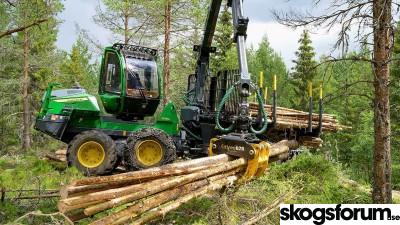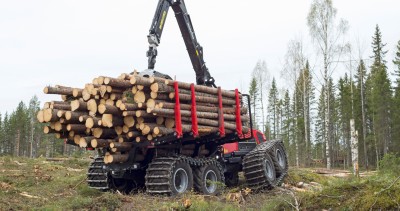So far, 310 new forwarders with a payload of over 9 tons have been registered* in Sweden in 2023. That is twice as much as during the same period last year. It indicates around 400 registered machines for 2023, a record for the Swedish forwarder market during the 2000s, only beaten by 2020 when 451 forwarders were registered.
The Swedish forwarder market
The sister-site Skogsforum.se collects and analyzes figures over registered forwarders from the Swedish Transport Agency each quarter. The conclusion for Q3 2023 is that 2023 might become a record-breaking year.
The reason for the vast volumes could be explained by the major problems in getting components last year, which delayed deliveries. Now, it seems the manufacturers have got the delivery chains in order, and the manufacturing pace is back to normal. The market leaders John Deere Forestry and Komatsu Forest have more than doubled the number of registered forwarders so far this year. Also, Ponsse and Rottne have increased deliveries essentially.
As for the smaller manufacturers, the result can end up being both better or worse than last year. So, the analysis of those will have to wait until the year is over. Below you can see what it looks like in Q1 – Q3 2023 compared to 2022. 
More school machines than ever
In the register data, it’s obvious that many suppliers register forwarders on themselves. The reason for this is that they have rental agreements with forestry schools. The machines are simply rented by the schools, at favorable conditions – Often based on used hours for one year. After that, the one-year-old machine is delivered to a contractor who signed for it before it went to the school, and a new machine is delivered to the school.
The Swedish supplier for John Deere Forestry seems to have the largest market for “school machines”. According to JD Sweden’s CEO, Henrik Johansson, some 40 machines will be delivered to Swedish forestry schools this year, including harvesters. It’s a smart way to make future generations of machine operators used to your brand, at a fair cost.
Furthermore, it’s a good way to help the schools attract young people to the forestry business. So far in 2023, 41 forwarders have been delivered to Swedish schools, 24 of whom were John Deere.
Many forest-company-owned machines
Most forest machines in Sweden are owned by small and medium-sized contractors. This year one of the major forest groups, Stora Enso, stands out as they have bought 11 forwarders Q1 – Q3 this year. In a normal year that would be 6 to 7 forwarders.
Of the 310 new forwarders registered so far this year, 31 have been registered on Holmen, SCA, Stora Enso, Sveaskog (the State Forest), and Södra (the South Swedish Forest Owner’s Association). This should be compared to an average of 20 for the last few years. Is this a new trend or just a coincidence? The future will tell.
Competition drives the development
The Swedish forwarder market is characterized by hard competition for market shares. A few suppliers dominate, and only a few percent are left over for the smaller suppliers/manufacturers. John Deere, Komatsu, and Ponsse represent 88 percent of the Swedish forwarder market. That leaves 12 percent for the rest (Rottne, EcoLog, Logset, Sampo, and Tigercat) to fight about.
This situation is not necessarily static over time. Competition is good for the customers and probably tough for the manufacturers. 

* In Sweden, all forwarders are registered by the authority Swedish Transport Agency (Transportstyrelsen) at delivery. As the Swedish market for CTL machines** is the largest in the World (2022), those figures give a fairly good picture of the total market for CTL machines. The harvesters are not registered by the Transport Agency, but the number of manufactured harvesters in most cases follows the number of forwarders.
This article is based on figures from the Swedish Transport Agency’s forwarder registrations and has been analyzed and compiled by Skogsforum.se.
** CTL = Cut-To-Length is a system based on two machines: one harvester that fells and cuts the trees into lengths at the stump in the forest, and a forwarder that brings the timber to the roadside. This type of machine is manufactured and used in the Nordic Countries. The CTL technology is gaining market share globally and is used in more than half of the World´s felling operations today. Most manufacturers of CTL machines are in Sweden and Finland.













